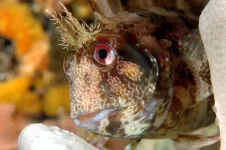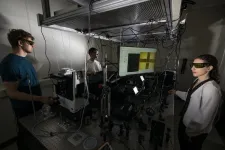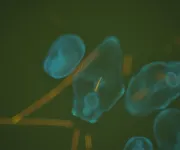The most endangered fish are the least studied
2024-07-17
(Press-News.org)
The most threatened reef fishes are also the most overlooked by scientists and the general public. That is the startling finding of a team of scientists led by a CNRS researcher.1 In a study to be published in Science Advances on July 17, they measured the level of human interest in 2,408 species of marine reef fish and found that the attention of the scientific community is attracted by the commercial value more than the ecological value of the fishes. The public, on the other hand, is primarily influenced by the aesthetic characteristics of certain species, such as the red lionfish (Pterois volitans) and the mandarinfish (Synchiropus splendidus).
Consider blennies (Blenniidae) and gobies (Gobiidae). These two fish families largely swim under the radar of both researchers and members of the public yet, as cleaners, they play a key role in the functioning of reefs. Small in size, they are essential to transfer of energy and matter from tiny prey to bigger consumers in reefs (trophodynamics).2
To reach their conclusions, the research team relied on big data compiled from scientific databases, social media, and Wikipedia page view statistics for the different fish species. They found that, though the 2,408 species studied accumulated more than 17 million views on Wikipedia, but that over 50% of those views were for only 7% of the species, and that 20% of the views were for only 1%. In addition, nearly 50% of the scientific publications for the fishes studied only concerned a subset of 1% of the species.
The research team's work brings to light a bias that directly threatens the conservation of marine reef fish, a bias of such magnitude that it compels them to sound the alarm. They emphasize the importance of aligning human interest in biodiversity with conservation needs and priorities for healthy ecosystems. They suggest launching campaigns to raise public awareness of threatened and neglected species. Finally, they advocate the establishment of research programs that take into account all ecosystem components, for a global conservation strategy that is no longer driven by commercial imperatives.
Notes
This research was a collaboration between scientists from the Marine Biodiversity, Exploitation and Conservation (CNRS / IFREMER / IRD / University of Montpellier) and Écologie Marine Tropicale des Océans Pacifique et Indien (IFREMER / IRD / University of Réunion / University of New Caledonia) research units and the Foundation for Biodiversity Research.
The trophodynamic chain is a set of interconnected food chains within an ecosystem. END
ELSE PRESS RELEASES FROM THIS DATE:
2024-07-17
Mindfulness training may lead participants to experience disembodiment and unity – so-called altered states of consciousness – according to a new study from researchers at the University of Cambridge.
The team say that while these experiences can be very positive, that is not always the case. Mindfulness teachers and students need to be aware that they can be a side-effect of training, and students should feel empowered to share their experiences with their teacher or doctor if they have any concerns.
Mindfulness-based programmes have ...
2024-07-17
When electronic devices like laptops or smartphones overheat, they are fundamentally suffering from a nanoscale heat transfer problem. Pinpointing the source of that problem can be like trying to find a needle in a haystack.
“The building blocks of our modern electronics are transistors with nanoscale features, so to understand which parts of overheating, the first step is to get a detailed temperature map,” says Andrea Pickel, an assistant professor from the University of Rochester’s Department of Mechanical Engineering. “But you need something with nanoscale ...
2024-07-17
Peek inside the human genome and, among the 20,000 or so genes that serve as building blocks of life, you’ll also find flecks of DNA left behind by viruses that infected primate ancestors tens of millions of years ago.
These ancient hitchhikers, known as endogenous retroviruses, were long considered inert or ‘junk’ DNA, defanged of any ability to do damage. New CU Boulder research published July 17 in the journal Science Advances shows that, when reawakened, they can play a critical role in helping cancer survive and thrive. The study also suggests that silencing certain endogenous retroviruses can make cancer treatments work better.
“Our study shows that diseases ...
2024-07-17
Researchers have uncovered an under-the-sea phenomenon where coral-destroying crown-of-thorns starfish larvae have been feasting on blue-green algae bacteria known as ‘sea sawdust’.
The team of marine scientists from The University of Queensland and Southern Cross University found crown-of-thorns starfish (COTS) larvae grow and thrive when raised on an exclusive diet of Trichodesmium – a bacteria that often floats on the ocean’s surface in large slicks.
UQ’s Dr Benjamin Mos from the School ...
2024-07-17
Mental health training for line managers is strongly linked to better business performance, and it could save companies millions of pounds in lost sick days every year, according to new research led by experts at the University of Nottingham.
The results of the study, which are published in PLOS ONE, showed a strong association between mental health training for line managers and improved staff recruitment and retention, better customer service, and lower levels of long-term mental health sickness absence.
The study was led by Professor Holly Blake from the School of Health Sciences at the University of Nottingham and Dr Juliet Hassard of Queen’s ...
2024-07-17
When it comes to diatoms that live in the ocean, new research suggests that photosynthesis is not the only strategy for accumulating carbon. Instead, these single-celled plankton are also building biomass by feeding directly on organic carbon in wide swaths of the ocean. These new findings could lead researchers to reduce their estimate of how much carbon dioxide diatoms pull out of the air via photosynthesis, which in turn, could alter our understanding of the global carbon cycle, which is especially relevant given the changing climate.
This research is led by bioengineers, bioinformatics experts and other genomics researchers ...
2024-07-17
UC Riverside environmental engineering team has discovered specific bacterial species that can destroy certain kinds of “forever chemicals,” a step further toward low-cost treatments of contaminated drinking water sources.
The microorganisms belong to the genus Acetobacterium and they are commonly found in wastewater environments throughout the world.
Forever chemicals, also known as per- and polyfluoroalkyl substances or PFAS, are so named because they have stubbornly strong carbon-fluorine chemical bonds, which make them persistent in the environment.
The microorganisms discovered by UCR scientists and their collaborators ...
2024-07-17
Research by the Technion has demonstrated that activation of the brain’s reward system could boost recovery from a heart attack. The research, which was conducted at the Ruth and Bruce Rappaport Faculty of Medicine, was led by Ph.D. student Hedva Haykin under the supervision of Prof. Asya Rolls and Prof. Lior Gepstein.
The Technion research group focused on the reward system, a brain network activated in positive emotional states and motivation and evaluated its potential in improving recovery ...
2024-07-17
ATLANTA — A research team at Georgia State University has developed tiny, potent molecules that are capable of targeting hidden strains of HIV. The source? Antibody genes from llama DNA.
The research, led by Assistant Professor of Biology Jianliang Xu, uses llama-derived nanobodies to broadly neutralize numerous strains of HIV-1, the most common form of the virus. A new study from this team has been published in the journal Advanced Science.
“This virus has evolved a way to escape our immune system. Conventional antibodies are bulky, so it’s difficult for them to find and attack the virus’ surface,” ...
2024-07-17
You join a swing dance class, and at first you’re all left feet. But – slowly, eyes glued to the teacher – you pick up a step or two and start to feel the rhythm of the big band beat. A good start.
Then you look over and realize the couple next to you has picked up twice the steps in half the time.
Why?
According to a new study from University of Florida biomechanical researchers, the quick, athletic learners among us really are built differently – inside their brains.
That’s what UF Professor of Biomedical Engineering Daniel Ferris, Ph.D., and his former doctoral student, Noelle Jacobsen, Ph.D., discovered when they studied how people learn ...
LAST 30 PRESS RELEASES:
[Press-News.org] The most endangered fish are the least studied






